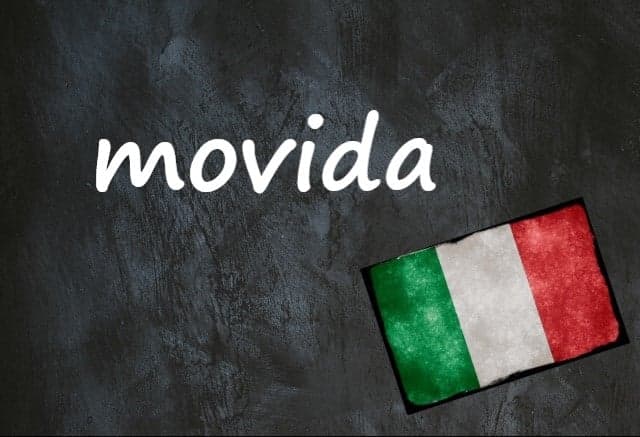
Italian word of the day: 'Movida'

Today's word isn't really Italian, but here's how Italians use it.
Movida is a word we've been seeing in a lot of Italian newspaper headlines this week, amid all the reports of large crowds outside bars after they were allowed to reopen.
If you thought it was a Spanish word, you'd be right. It was initially borrowed by Italians to describe the late-night partying going on across the Mediterranean in the 80s.
Dictionaries say the term movida was first coined in 1980s Spain to describe the resurgence of the country's cultural and social life after the fall of Franco's regime. In Spanish, it means "movement, happening, affair, or gathering."
Soon after, the word was adopted by Italians and "used jokingly to describe the evening and night life of a city, with specific reference to that of the Spanish cities, known for being lively until the early hours".
Of course, Italians aren't exactly known for their early bedtimes either, especially in summer. And today la movida has also come to describe the way people here spend warm summer nights outdoors.
The term hints at drinking and partying. But it's also used to describe any sort of gathering - usually of young people meeting up with friends at the piazza (square) or lungomare (seafront), often in large groups, maybe for a drink, a walk around town, or just to stand and chat.
It's not the same thing as the passeggiata, the leisurely evening stroll which may or may not include stopping for an aperitivo, and which has somewhat more elegant connotations. That word is also used seriously in normal conversations, while movida usually isn't.
The word isn't unusual, and you'll be understood by Italians if you use it - but it's not one you'll hear much in everyday conversation.
It's a somewhat retro term - which Italian friends tell me is usually used ironically, perhaps by their parents, but most often by Italian newspaper editors.
So if you attempt to drop this word into your next Italian conversation, remember you'll need a big dollop of irony to go with it
Do you have a favourite Italian word you'd like us to feature? If so, please email us with your suggestion.
Comments
See Also
Movida is a word we've been seeing in a lot of Italian newspaper headlines this week, amid all the reports of large crowds outside bars after they were allowed to reopen.
If you thought it was a Spanish word, you'd be right. It was initially borrowed by Italians to describe the late-night partying going on across the Mediterranean in the 80s.
Dictionaries say the term movida was first coined in 1980s Spain to describe the resurgence of the country's cultural and social life after the fall of Franco's regime. In Spanish, it means "movement, happening, affair, or gathering."
Soon after, the word was adopted by Italians and "used jokingly to describe the evening and night life of a city, with specific reference to that of the Spanish cities, known for being lively until the early hours".
Of course, Italians aren't exactly known for their early bedtimes either, especially in summer. And today la movida has also come to describe the way people here spend warm summer nights outdoors.
The term hints at drinking and partying. But it's also used to describe any sort of gathering - usually of young people meeting up with friends at the piazza (square) or lungomare (seafront), often in large groups, maybe for a drink, a walk around town, or just to stand and chat.
It's not the same thing as the passeggiata, the leisurely evening stroll which may or may not include stopping for an aperitivo, and which has somewhat more elegant connotations. That word is also used seriously in normal conversations, while movida usually isn't.
The word isn't unusual, and you'll be understood by Italians if you use it - but it's not one you'll hear much in everyday conversation.
It's a somewhat retro term - which Italian friends tell me is usually used ironically, perhaps by their parents, but most often by Italian newspaper editors.
So if you attempt to drop this word into your next Italian conversation, remember you'll need a big dollop of irony to go with it
Do you have a favourite Italian word you'd like us to feature? If so, please email us with your suggestion.
Join the conversation in our comments section below. Share your own views and experience and if you have a question or suggestion for our journalists then email us at [email protected].
Please keep comments civil, constructive and on topic – and make sure to read our terms of use before getting involved.
Please log in here to leave a comment.